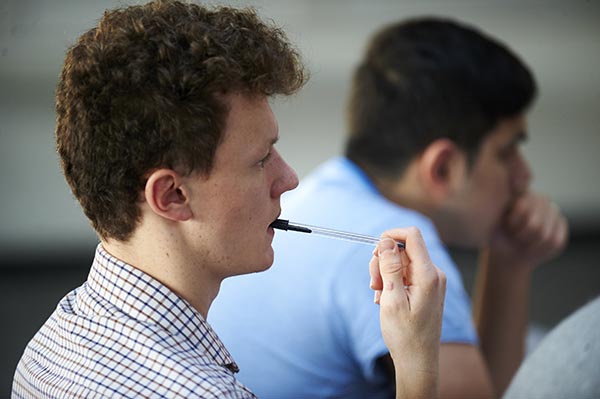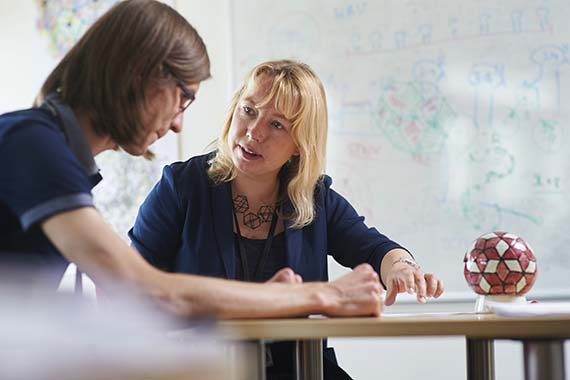
MSc Mathematical Sciences
Deepen your mathematical knowledge and move towards cutting-edge research under the guidance of world-leading experts
Year of entry: 2026 (September)
This course will develop your mathematical knowledge through a range of modules concentrated on one of our research specialisms in algebra, number theory, geometry and analysis, mathematical physics and mathematical biology. It will provide a bridge to world-class research in one of these areas.
It combines both traditional mathematics subjects with advanced courses that will prepare you for an array of numerate and analytical professions to be found at the core of the digital economy, as well as prepare you for a PhD or other research paths.
As part of the Department of Mathematics at York, you will join our friendly and welcoming community. You'll benefit from high-quality teaching by expert staff, who are engaged in world-leading research in many areas of mathematics.
Course content
You choose a pathway through this degree which concentrates either on pure mathematics or on applied mathematics. In each, you'll take modules which prepare you for research, aligned with our research groups. You'll also have the opportunity to take modules outside your route to broaden the scope of your study.
The pathway in Pure Mathematics centres on algebra and number theory with additional material in geometry and analysis.
The pathway in Applied Mathematics centres on mathematical physics and mathematical biology, which both have overlap with industrial and applied mathematics.
You'll undertake both a preparatory project and a dissertation in specialised subjects of your choice, with the aim of taking your research skills and understanding towards the frontiers of knowledge, with support and supervision from a dedicated member of staff.
Modules
Core modules
Option modules
You will study five option modules from one of two pathways. Example modules can be found below. Some option module combinations may not be possible. The options available to you will be confirmed after you begin your course.
Pure Mathematics Pathway
- Commutative Algebra and Algebraic Geometry
- Prime Numbers and Their Distribution
- Measure and Integration
- Differential Geometry
- Frontiers in Mathematics
- Geometric and Analytic Number Theory
- Partial Differential Equations
- Riemann Surfaces and Algebraic Curves
- Lie Theory
Applied Mathematics Pathway
- Partial Differential Equations
- Quantum Field Theory
- Quantum Theory and Quantum Information
- Riemann Surfaces and Algebraic Curves
- Fluids
- Mathematical Modelling: Nonlinearity, Uncertainty, and Computational Methods
- Mathematical Ecology, Epidemiology and Evolution
- General Relativity
- Frontiers in Mathematics
- Statistics for Artificial Intelligence I
Our modules may change to reflect the latest academic thinking and expertise of our staff, and in line with Department/School academic planning.
Dissertation
You will complete a preparatory project and a dissertation. You'll have a supervisor with expertise in your chosen field of research.
Learning outcomes
Every course at York is built on a distinctive set of learning outcomes. These will give you a clear understanding of what you will be able to accomplish at the end of the course and help you explain what you can offer employers. Our academics identify the knowledge, skills, and experiences you'll need upon graduation and then design the course to get you there.
Learning outcomes for this course
- Use, with a high level of sophistication and accuracy, the language of mathematics and mathematical techniques that underpin a wide range of research in, and applications to, science, technology and industry.
- Recognise and critically evaluate appropriate advanced mathematical methods in order to find a suitable strategy for solving unfamiliar problems open to mathematical investigation and solve such problems.
- Use logical reasoning as a basis for the critical analysis of ideas or statements in advanced mathematics, and develop independently their own ideas using well-founded reasoning.
- Conduct a study of a specialised area of mathematics which takes into account recent mathematical progress. They will be able to compare multiple sources, including research articles, to inform this study and be able to check or complete technical details from these sources independently.
- Communicate advanced mathematical ideas clearly, both in writing and in a presentation, at a level appropriate for the intended audience.
- Confidently use tools in information technology for a range of appropriate tasks, such as typesetting and literature review.
Fees and funding
Annual tuition fees for 2026/27
| Study mode | UK (home) | International and EU |
|---|---|---|
| Full-time (1 year) | £12,500 | £29,900 |
Fees information
UK (home) or international fees? The level of fee that you will be asked to pay depends on whether you're classed as a UK (home) or international student. Check your fee status.
Find out more information about tuition fees and how to pay them.
Funding information
Discover your funding options to help with tuition fees and living costs.
We'll confirm more funding opportunities for students joining us in 2026/27 throughout the year.
If you've successfully completed an undergraduate degree at York you could be eligible for a 10% Masters fee discount.
Funding opportunities
Chevening Scholarships
We are pleased to work with Chevening Scholars to offer funding for our Masters programmes. Chevening Scholarships provide one year of fully-funded postgraduate study in the UK for international (including EU) students. The scholarships are open to early and mid-career professionals who have the potential to become future leaders.
Teaching and assessment
You’ll work with world‐leading academics who’ll challenge you to think independently and excel in all that you do. Our approach to teaching will provide you with the knowledge, opportunities, and support you need to grow and succeed in a global workplace.
Teaching format
We use a wide range of teaching methods to suit different learning styles including:
- Lectures (both online and on campus)
- Problems classes
- Seminars
Lectures are used to describe new concepts you will have to learn and problems classes put them into practice. Seminars are small, interactive sessions which allow us to focus on your individual needs. As part of the online lectures, you will also be able to access a wide range of short videos discussing topics covered in your lectures. These bite-sized clips will come with a set of notes to help reinforce your knowledge on the given topic.
While you're working on your project and your dissertation you'll have regular meetings with an academic supervisor who can offer advice and support. We aim to give you a supervisor with specialist knowledge of the area you're investigating.
Teaching location
You will be based in the Department of Mathematics in the Ian Wand Building on Campus East. Most of your small group teaching and larger classes will take place in the Ian Wand Building or nearby on Campus East.
About our campus
Our beautiful green campus offers a student-friendly setting in which to live and study, within easy reach of the action in the city centre. It's easy to get around campus - everything is within walking or pedalling distance, or you can always use the fast and frequent bus service.
Assessment and feedback
For the majority of taught modules, assignments are set every fortnight. These assignments will help you develop your skills and identify areas for improvement. You'll receive verbal and written feedback during seminars, when you'll have a chance to discuss your work.
Most modules' final assessments take the form of closed exams. You'll be able to see past papers ahead of each exam which will give you an idea of the topics which may be covered and the level of complexity involved.
You'll also be assessed on presentations, project reports and your final dissertation.
Careers and skills
The skills you develop on this course are in high demand in advanced careers that rely on logic and problem solving. It's also ideal preparation if you want to take your studies to a higher level.
Career opportunities
- Quantitative financial analyst
- Data analyst
- Credit risk manager
- Statistician
- Software developer
Transferable skills
- Confidence with high-level mathematics
- Logical thinking
- Analysis of problems
- Problem-solving
- Time management
- Communication skills
- Research skills
Entry requirements
| Qualification | Typical offer |
|---|---|
| Undergraduate degree | 2:2 or equivalent in Mathematics or in a subject with a substantial mathematics component. |
| Other international qualifications | Equivalent qualifications from your country |
English language
If English isn't your first language you may need to provide evidence of your English language ability. We accept the following qualifications:
| Qualification | Minimum requirement |
|---|---|
| IELTS (Academic and Indicator) | 6.0, minimum 5.5 in each component |
| Cambridge CEFR | B2 First: 169, with no less than 162 in each component |
| Oxford ELLT | 6, minimum of 5 in each component |
| Oxford Test of English Advanced | 126, minimum 116 in each component |
| Duolingo | 105, minimum 95 in all other components |
| LanguageCert SELT | B2 with 33/50 in each component |
| LanguageCert Academic | 65 with a minimum of 60 in each component |
| Kaplan Test of English Language | 444-477, with 410-443 in all other components |
| Skills for English | B2: Pass with Merit overall, with Pass in each component |
| PTE Academic | 55, minimum 51 in each component |
| TOEFL | 79, minimum 17 in Listening, 18 in Reading, 20 in Speaking and 17 in Writing |
| Trinity ISE III | Pass in all components |
For more information see our postgraduate English language requirements.
If you haven't met our English language requirements
You may be eligible for one of our pre-sessional English language courses. These courses will provide you with the level of English needed to meet the conditions of your offer.
The length of course you need to take depends on your current English language test scores and how much you need to improve to reach our English language requirements.
After you've accepted your offer to study at York, we'll confirm which pre-sessional course you should apply to via You@York.
Next steps
Contact us
Get in touch if you have any questions
.jpg)
Discover York







